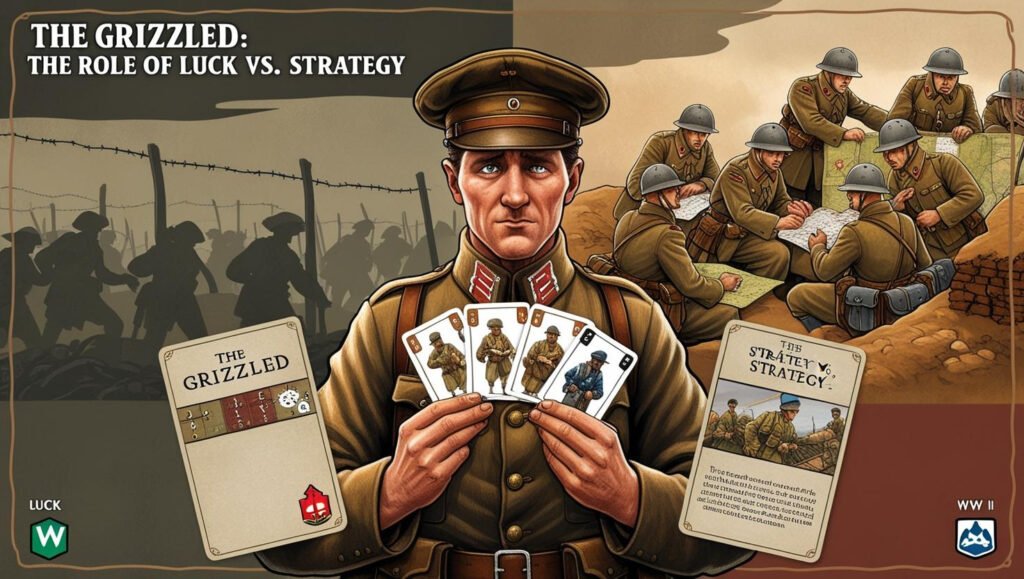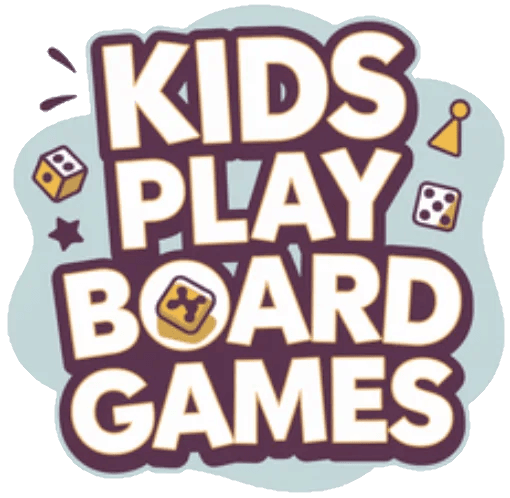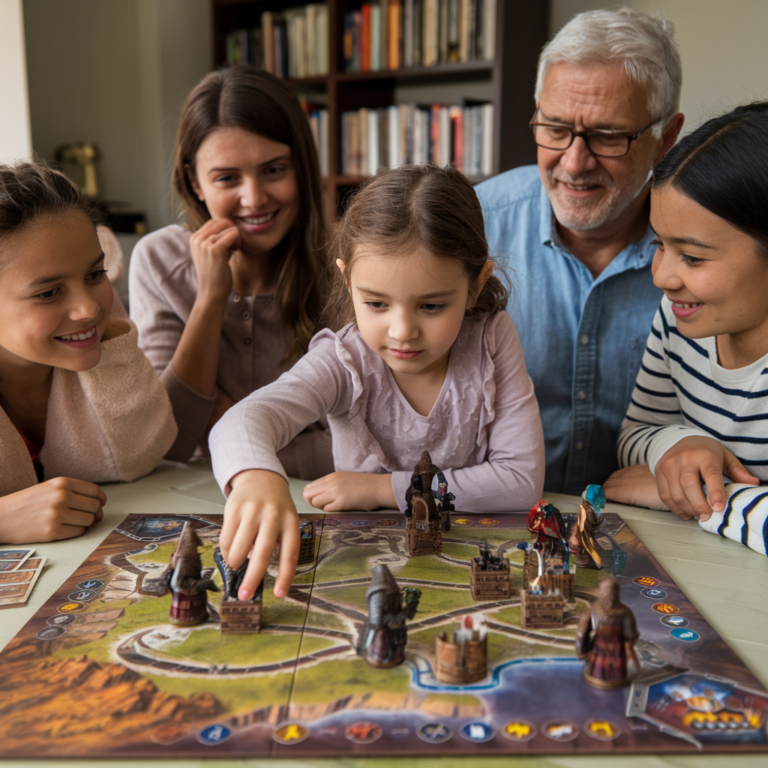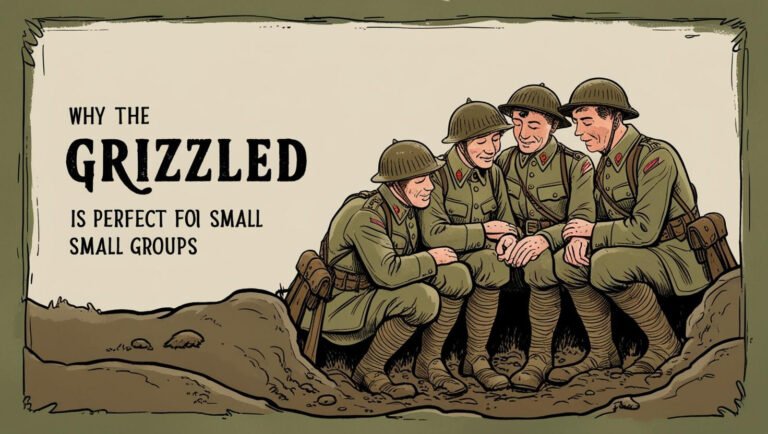The Grizzled:The Role of Luck vs. Strategy

The Grizzled – just the name itself evokes a sense of hardship and resilience. This cooperative board game throws you and your fellow players into the trenches of World War I, not to conquer, but to survive. But how much of your survival hinges on sheer luck, and how much on clever planning? Let's dive into the trenches and explore the balance between luck and strategy in “The Grizzled.”
The Unpredictable Battlefield: The Role of Luck
Let's be honest, luck is a significant factor in “The Grizzled,” and it primarily manifests itself in the dreaded draw pile. Each turn, players draw cards from the Peace pile, and these cards are the game's way of throwing obstacles in your path.
The Card Draw: Nature's Fury & Psychological Trauma
These cards represent the harsh realities of war:
- Harsh Weather: Snow, Rain, Night – limiting visibility and slowing progress.
- Threats: Whistles, Gas, Shells – immediate dangers that can overwhelm you.
- Traumas: Representing the psychological toll of war, these can severely hinder a soldier’s ability to cope and are the toughest to get rid of.
The order and combination in which these cards appear are entirely random. You might have a meticulously planned turn ready to go, only to draw a handful of nasty threats that completely derail your strategy. It's like preparing for a sunny hike and suddenly getting hit by a blizzard – that’s the luck element in “The Grizzled” in full force.
The Grizzled masterfully balances luck and strategy, demanding careful planning while navigating unpredictable card draws and threats. For a full breakdown of its tense cooperative mechanics, read our in-depth review of The Grizzled. If you enjoy strategic depth, see how it stacks up against Forbidden Island in decision-making and tension. Prefer games where skill outweighs chance? Explore budget-friendly cooperative titles with balanced mechanics. Fans of light strategy blended with luck will love games like Sushi Go!, perfect for quick, tactical fun.
The Unpredictable Hand: You Get What You Get
Adding another layer of luck is the initial hand of cards each player receives. Some players might start with a hand full of support cards, ready to help others, while others might be dealt a hand heavy with their personal traumas. This initial distribution can significantly influence the early game and how smoothly (or roughly!) things begin.
Planning Your Survival: The Power of Strategy
Despite the undeniable presence of luck, “The Grizzled” is far from a game of pure chance. Strategy, communication, and teamwork are absolutely vital to weathering the storm. Clever decision-making is your shield against the onslaught of bad luck.
Teamwork is Dreamwork: Communication and Coordination
The core strategy in “The Grizzled” revolves around cooperation. You win or lose together. This means constant communication is key:
- Sharing Information (Subtly): While you can't explicitly show your hand, you can hint at the types of cards you have. “I'm feeling a bit exposed to the weather right now,” subtly tells your teammates you might need weather protection.
- Planning Together: Before each player commits to a turn, discuss potential strategies. “Should we focus on removing threats this round, or try to get rid of some traumas?” Open discussion allows for better resource allocation.
- Recognizing Strengths & Weaknesses: Understanding what each player's hand might be strong or weak against helps in deciding who should play which cards and when.
Strategic Card Play: Choosing Your Battles
Every card played is a strategic choice. You need to consider:
- Timing is Everything: Playing a support card at the right moment can be game-changing. Saving a “Snow” card for when multiple weather threats are on the table, or using a morale boost when spirits are low, makes a big difference.
- Sacrifice for the Greater Good: Sometimes, you need to take a hit to protect the team. Playing a card to absorb a threat that would otherwise overwhelm another player, even if it means adding a hardship to your own pile, can be the necessary sacrifice.
- Managing Your Hand: Knowing when to play cards and when to hold onto them is crucial. Don't waste valuable support cards too early, but don't hoard them until it's too late either.
Mitigating Bad Luck: Taming the Chaos
While you can't control the card draws, you can strategize to minimize the impact of bad luck:
- Diversify Your Protection: Try to have a spread of protection against different types of threats and weather across the team's hands. Don't rely too heavily on one player to handle all the “Night” threats, for example.
- Focus on Removal: Actively work to remove hardships and threats from the table. The longer they linger, the more they accumulate and compound the difficulty.
- Adaptability: Be prepared to change your plans on the fly. “The Grizzled” rarely goes according to plan. Being flexible and adapting to unexpected card draws is a key strategic skill.
Here's a quick table summarizing the balance:
| Feature | Luck Aspect | Strategic Aspect |
| Card Draws | Random order of Peace and Hardship cards | Player decisions on how to react to drawn cards |
| Initial Hands | Random distribution of starting cards | Utilizing hand effectively, communicating needs |
| Game Outcome | Unpredictable sequence of events can be harsh | Teamwork, planning, and adapting to mitigate randomness |
Luck vs. Strategy: My Verdict & Personal Experiences
In my experience, “The Grizzled” strikes a fascinating balance. Luck is definitely a significant factor, and sometimes, no matter how well you play, the cards just seem determined to bury you. There have been game nights with friends where we've laughed (and maybe cried a little internally!) at the sheer absurdity of the bad luck we were facing. I've been playing tabletop games for over 20 years, and cooperative games are a particular favorite because they create a shared experience – win or lose. I've found this to be especially true of “The Grizzled.”
In The Grizzled, the balance between luck and strategy is key to survival. Whether you're mastering the basics with our beginner's guide to the card deck or diving into advanced win strategies, every decision counts. Learn how to navigate each round effectively with our step-by-step gameplay guide, and discover how the game fosters empathy and social skills in small groups. Perfect for intimate gatherings, The Grizzled shines as a small-group board game that challenges both your luck and tactical thinking.
I remember one game so vividly. We were teaching “The Grizzled” to some friends who were new to cooperative games. The look on their faces as the hardships piled up was priceless – a mix of amusement and growing panic. My wife (who is a master strategist in most games) was trying to keep us all organized, but the cards were just unrelenting. My daughter (who was still in her teens at the time) just kept saying “This is ridiculous!” as she was buried under trauma cards – but she was also giggling. It was a perfect example of how the game creates shared stories and memories, even when things go horribly wrong. I could tell they didn't really ‘get' the game, and that was OK!
And then there's our regular gaming group. The game always prompts deep discussion after, about war, the realities of psychological trauma, and empathy for those who experience hardship. I've even researched some of the historical aspects of WWI after playing to better appreciate the context of the game.
However, that's also part of the charm. “The Grizzled” isn't about perfect strategic execution leading to guaranteed victory. It's about resilience in the face of adversity. It's about making the best decisions you can with the cards you are dealt, and relying on your teammates to weather the storm together. We've learned to celebrate the small victories within the losses – a perfectly timed support card, a successful mission, a round where we actually managed to get a bit of morale back.
While luck can feel dominant at times, I believe strategy and teamwork are ultimately more crucial for consistent success. A skilled team that communicates effectively, plans strategically, and adapts to the unpredictable nature of the game will fare far better than a group relying solely on lucky draws. I regularly moderate board game discussion forums, and this sentiment is echoed by many experienced “Grizzled” players.
“The Grizzled” leans into the feeling of being in a desperate situation where things are often outside of your control – mirroring the realities of war. But within that chaos, your choices, your teamwork, and your grit are what truly matter. It's a game that reminds you that even when luck is against you, smart decisions and strong bonds can make all the difference. It's a game that I would recommend to any experienced gamers who are looking for a challenge.






